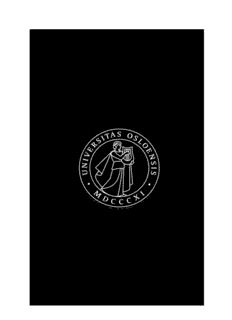
American Foreign Aid and Foreign Policy PDF
Preview American Foreign Aid and Foreign Policy
American Foreign Aid and Foreign Policy American foreign aid to Afghanistan in relation to American foreign policy, foreign policy traditions, and American interests Anders Nandrup Rylander The Department of Literature, Area Studies, and European Languages North American Area Studies Faculty of Humanities In partial fulfilment of the requirements for the MA degree in North American Area Studies Advisors: Ida Jahr and Mark Luccarelli UNIVERSITY OF OSLO Spring 2015 I II American Foreign Aid and Foreign Policy American foreign aid to Afghanistan in relation to American foreign policy, foreign policy traditions, and American interests III © Anders Nandrup Rylander 2015 American Foreign Aid and Foreign Policy Anders Nandrup Rylander http://www.duo.uio.no Print: Reprosentralen, University of Oslo IV Abstract The presented Masters Thesis seeks do develop a better understanding of the relationship between American foreign aid, American foreign policy traditions, American foreign policy towards Afghanistan for the years 2007-2012, and American interests. It does so by answering the following questions: Theories on development typologies reveal that there are several ways to build a failed state, but what particular type of state building does the U.S. government do, and what is their reasoning for doing it? And is this consistent with its foreign policy? How does this relate to American foreign policy traditions and American interests? In order to do this I define American foreign policy traditions and American self- interest, as well as accounting for three different development typologies: State-building, nation-building, and society-building. To connect these aspects of American foreign relations to a specific case, I analyse the American aid efforts in Afghanistan for the years 2007-2012, using American reports to OECD, accounting for Official Development Assistance (ODA). The data is divided according to the three typologies in order to discuss the American strategy when donating aid and forming foreign policy goals. The analysis and discussion of the thesis exposes that American aid work in Afghanistan at some points is consistent with American foreign policy goals in Afghanistan, but also that there are conflicting elements between foreign policy goals and the aid effort during the years researched. The American foreign policy goals in Afghanistan also contain elements of at least two American foreign policy traditions, exposing a difference between the foreign relation strategy of the Truman Doctrine and the Bush Doctrine. American interests are present in all foreign policy goals and the aid effort in Afghanistan, but somewhat surprisingly, they are not rooted in economic interests; stability and safety for American citizens are the predominant American interests being represented when the U.S. government contributed with foreign aid in Afghanistan. V VI Acknowledgements First of all I would like to thank both my advisors, Ida Jahr and Mark Luccarelli, whom without I would not have been able to finish this thesis. Ida provided me with inspiration and insight that was essential for the initial phase of my work with the thesis. Mark helped me greatly with concentrating my discussion and pushing me when the months left seemed to few for me to be able to complete my thesis. And to my fellow students these past years, without you the academic experience would have never been as rewarding. I would also like to thank my parents for providing me with the opportunity to study, and for all kinds of support the past years. Their support and encouragement has been critical for my attainment of a Masters Degree. Finally I would like to thank Ingrid Marie Jørgensen for her help with proofreading, but especially for her relentless positive attitude during moments of personal doubt. Without her, the process of writing this thesis would have been far from as pleasant as it turned out to be. VII VIII Table of Contents Introduction ..................................................................................................................................... 1 1 Definitions, theories, and foreign relations discussions ........................................... 3 1.1 The War in Afghanistan ............................................................................................................... 3 1.2 Defining foreign aid ...................................................................................................................... 4 1.3 Defining self-‐interest ................................................................................................................... 7 1.4 Why do governments contribute with foreign aid? ......................................................... 13 1.5 Theoretical framework: Typology of State-‐building ....................................................... 16 1.6 Hypothesis and methodology .................................................................................................. 21 1.7 American foreign policy traditions ....................................................................................... 22 1.8 Conclusion ..................................................................................................................................... 25 2 An analysis of U. S. Foreign aid to Afghanistan from 2007 to 2012 ..................... 27 2.1 Introduction to the quantitative data ................................................................................... 27 2.2 Dividing the data according to the typologies ................................................................... 27 2.3 Reliability and validity .............................................................................................................. 30 2.4 The use of the data ...................................................................................................................... 31 2.5 Total distributions ...................................................................................................................... 32 2.5.1 Total distribution of U.S. aid to Afghanistan (2007-‐2012) .................................................. 32 2.5.2 Distribution per agency ...................................................................................................................... 33 2.5.3 Distribution per typology ................................................................................................................... 34 2.6 The relation between the extending agencies and aid recipients by category ...... 39 2.6.1 State-‐building .......................................................................................................................................... 39 2.6.2 Nation-‐building ....................................................................................................................................... 41 2.6.3 Society-‐building ...................................................................................................................................... 42 2.7 Comparing aid recipients by type .......................................................................................... 43 2.7.1 Comparing the distribution of aid per extending agency ..................................................... 44 2.7.2 Comparison of the projects’ purpose and the difference between small and large projects ...................................................................................................................................................................... 46 2.7.3 Comparing the total spending and amount of projects per typology ............................. 49 2.8 Conclusion ..................................................................................................................................... 51 3 Foreign policy traditions, foreign policy towards Afghanistan, U.S. Afghan aid, and American interests ....................................................................................................... 53 3.1 U.S. foreign policy goals in Afghanistan (2007-‐2012) ..................................................... 53 3.2 Comparison of American foreign policy goals and the results of the quantitative analysis ........................................................................................................................................... 57 3.3 The shift of priority from nation-‐building to state-‐building related to U.S. policy towards Afghanistan .................................................................................................................. 60 3.4 American interests in Afghanistan ........................................................................................ 66 3.5 Reflections on American foreign policy traditions in relation to policy towards Afghanistan and the results of the quantitative analysis .............................................. 70 Conclusion ...................................................................................................................................... 76 Bibliography .................................................................................................................................. 83 Appendix ......................................................................................................................................... 87 IX X
Description: